Now that you've decided to leave everything behind and go traveling, let's get down to the nitty-gritty: how much does a trip around the world cost? In this chapter, we'll take a look at how to estimate the budget for a round-the-world trip, based on the main expense factors. We'll also share with you the details of everything we spent on our long-term trip.

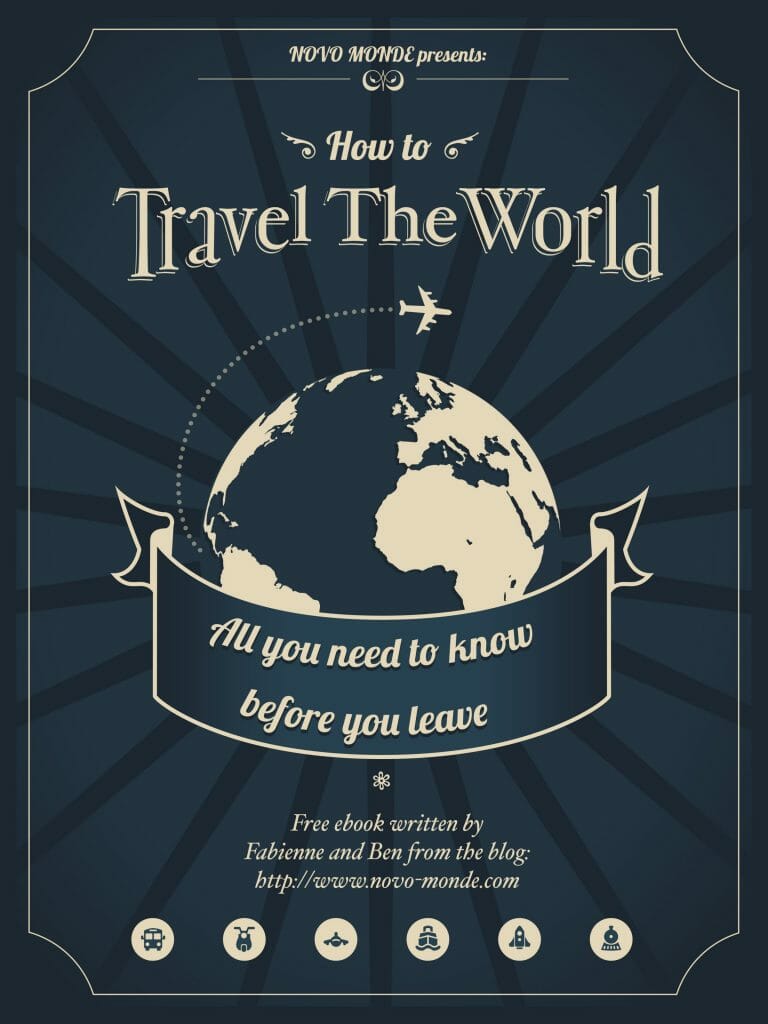
You are currently reading the second chapter of our free ebook How to travel the world, in which you will find all the necessary advice and preparations for your trip around the world!
In addition to the version on the blog, there is a PDF version to read it peacefully on your computer, smartphone, or tablet, or to print it 🙂.

How much does it cost to travel around the world?
That's probably THE big question we all ask ourselves… It's pretty hard to give a clear and precise answer… There are probably as many round-the-world budgets as there are travelers!
But if we can't answer it for you, we'll show you the price ranges for a round-the-world trip and tell you a little more about our budget, so you can get an idea!
Trips around the world for millionaires
Before we left, I came across an article about a travel agency offering a 1.5 million euro round-the-world trip! This trip took its lucky owner around the world for 2 years in a very "luxury" version…
In short, as you may have guessed, we are not the purchasers of this charming little trip around the world… At the same time, at the risk of appearing hypocritical to some, I can guarantee you that such a trip would not make us dream.
Around the world on 2 euros a day
Alongside these trips for millionaires in search of thrills and escapism, you'll also find people on the web who have decided to travel the world on absolutely minimal budgets. A round-the-world trip on foot with 2 euros a day, a round-the-world hitchhiking trip…
As you can see, there's a world of difference between a luxurious round-the-world trip with a daily budget of a whopping 2054 euros, and a trip around the world on foot with a budget of 2 euros a day!


Backpacking around the world: an economical way to travel
We've decided to keep this trip around the world simple, but without sacrificing comfort and a minimum of security. We could define ourselves as little backpackers, and this mode of travel allows us to save a lot of money!
No 4-star hotels and no 1st-class travel, but we promise we're not badly off! We opt for youth hostels, camping sites, apartment rentals, couchsurfing and nice little guesthouses, alternating with nights on buses, trains or boats to save a few nights whenever possible.
During a round-the-world trip or any long-term trip, we try to favor local transport as much as possible, while avoiding taking the plane too often. To find out more about local means of transport, you can read our article about transport in China.
Benoit tried to convince me to discover South America by bike but being hopeless on two-wheelers, I kindly declined! In short, we did South America by bus instead! Well, I did spend a week cycling in Taiwan, which wasn't bad, was it?
When it comes to food, we love to try out all the flavors of the countries we visit (street food, small authentic restaurants), but we also love to explore local markets and supermarket shelves to prepare our own little picnics. After more than a year and a half on the road around the world, we can't say enough about what we've enjoyed!








Costs before setting off on a round-the-world trip
The best way to know how much your round-the-world trip will cost is to break down your expenses by estimating each item as closely as possible. In this section, we look at all the expenses you need to take into account before your big departure.
Travel insurance
For a worry-free trip, it's important to be well-insured. The range of insurance options is vast, and we'll devote an entire chapter to it below. To give you an idea of the cost, travel insurance ranges from 300 to 2000 euros a year, depending on the services you require.
So, as you can see, the differences between the budgets of different travelers can already be considerable! For our part, we opted for WorldNomads for 1980 euros per year for 2, or 990 euros per person. But to tell you the truth, if we had to do it all over again, we'd change our travel insurance. Today, we'd opt for TrueTraveller instead, but we'll let you compare 😉. After this round-the-world trip and other long-term travels, we've scoured a good number of insurances and created an ultra-complete guide with a travel insurance comparison.
Vaccine budget

Here too, the financial gap can continue to widen; vaccines are unique to each individual. You'll come across many travelers who have decided to leave without any vaccinations. Others will be vaccinated against diseases that don't even exist in the region where they'll be staying, but have decided to go all out. But we don't want to get into that debate.
The best thing to do is visit your doctor for advice tailored to your needs. We've also prepared a special section on vaccines later in this guide. For our part, the cost was just under 700 euros per person to refresh our essential vaccines and get a few destination-specific vaccines, but that was in Austria. And Austria is not particularly known for its cheap medicine! Expect to pay between 270 and 500 euros for your vaccinations, depending on the hospital… However, for our Swiss friends, we'll let you guess why we decided to do it in Austria…
Equipment budget for a trip around the world

Clothes, hiking gear and computers
A bit like insurance, there's something for everyone. You can, for example, choose to equip yourself only with the big trekking and mountain brands, or use your old clothes and complete your wardrobe a little by going to Decathlon or buying online. The equipment cost can be multiplied fivefold depending on which option you choose! On the whole, quality and lightness come at a price… We invite you to read the chapter about backpacking gear for a round-the-world trip, in which we detail exactly what we pack in our backpacks.
The same applies to computer equipment. We decided to leave with our laptops, a camera, an external hard drive, a camera, and so on… So obviously, this adds to the budget of a round-the-world trip if you need to buy the necessities. And don't forget that it's in your interest to have your valuable computer equipment insured for a trip like this. The more your equipment is worth, the more it will cost to insure it in case of loss or theft.
Our gear budget
Financially, we spent around 320 euros per person, buying mainly jackets (softshell and fleece), as well as small equipment (padlock, kit, gas burner, protective cover, rucksack, storage, universal adapter, travel crockery, etc.) from Decathlon.
We've both decided to take our existing electronic equipment (laptop, cellphone and camera) with us, so there's no need to invest in that before departure.
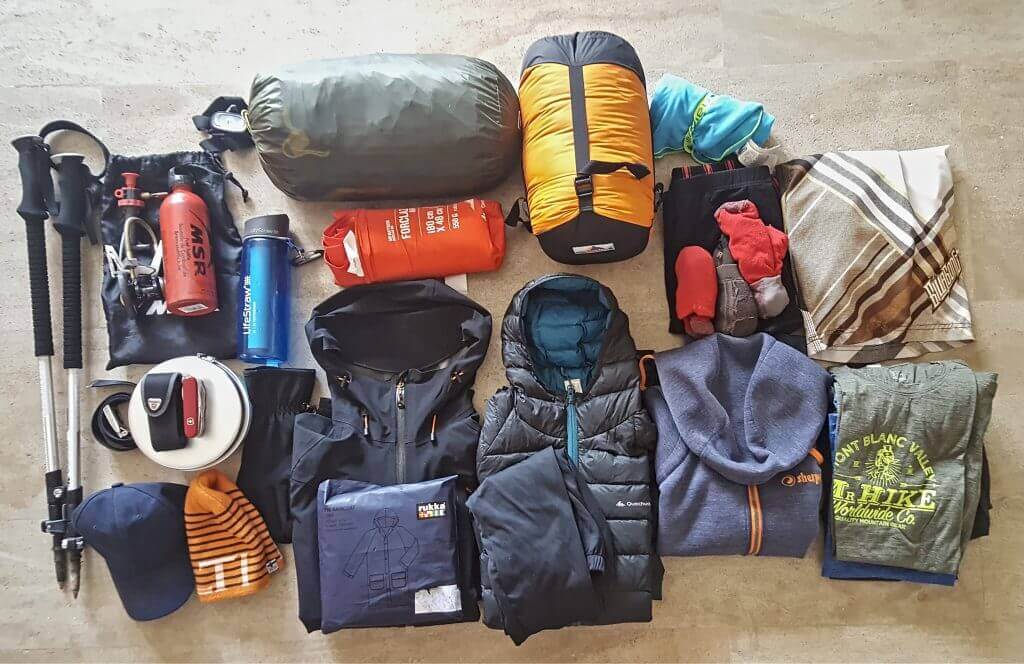
A piece of advice: buy only the bare essentials! Your hiking pants giving out? No problem, you'll probably find the same in South-East Asia. We'll come back to this in the dedicated article, but you'll find everything you need along the way, so there's no need to plan "just in case" 😉.
The transportation cost
The transportation budget is the expense item that is generally greatly underestimated in a round-the-world trip cost. Assuming you're going by plane (and not by van, boat, bike or on foot), tickets will make up the majority of the transportation expense item. When it comes to plane tickets, there's an initial choice to be made: round-the-world ticket or individual purchase?
Round-the-world tickets
Round-the-world tickets are very flexible, which is good, but it also means that their price can vary enormously! In fact, it all depends on your desires, but you should know that the price is calculated according to the following points:
- number of kilometers covered;
- number of continents;
- country or even city of departure;
- number of destinations.
To give you an idea, a round-the-world ticket generally costs between 2500 and 5000 euros. Ours cost 3078 euros each for this itinerary: Lyon - Beijing - Canton - Taipei - Hong Kong - Bangkok - Jakarta - Sydney - Santiago - Easter Island - Santiago - Punta Arenas - Bogota - Lyon.

Airline tickets are purchased as you go along
Of course, you can also choose not to purchase a round-the-world ticket and buy your plane tickets as you go along (or buy them all before departure). We explain why we decided not to make this choice in this article.
All in all, I think that round-the-world tickets may make you a little less flexible than individual plane tickets. Still… They're quite adaptable: we changed almost all our flight dates! In any case, they'll save you from tearing your hair out along the way when you want to leave a country or region and can't find a reasonably-priced flight for the dates you want.
Please note: if, like us, you leave with a round-the-world ticket but decide to extend your trip, you'll automatically lose your last flight! In fact, round-the-world tickets are not valid for more than 12 months! We had a return flight from Bogota to Lyon in August 2014, which we didn't take. So we had to buy another ticket for our return to Europe!
So, round-the-world tickets or tickets as you go? We've devoted a chapter of the e-book to choosing your itinerary and plane tickets for a round-the-world trip, so you can make up your own mind. It's really a question of choice, we simply decided that we wanted to leave with peace of mind, without having to spend our evenings on flight comparison sites looking for the next best deal…
Our pre-departure budget
| Expense item | How many days? | Cost per person |
|---|---|---|
| Vaccines | - | 650 € |
| Plane tickets | - | 3048 € |
| Backpacking gear | - | 320 € |
| Travel insurance | 365 days | 980 € |
| Visa in China | 90 days | 75 € (at the time) |
| Total budget | - | 5073 € |
Costs when you're on a round-the-world trip
The visa budget
Visas are an expense item to think about when planning your round-the-world trip, but they're not the most expensive, at least not for the countries we visit most often. And as long as you avoid Bhutan (the visa costs 5433 euros for one month! OK, the visa costs 20 dollars plus a fee of 200 dollars per day), you shouldn't have any nasty surprises! The most expensive visas are to be found in Asia, but they are often quite reasonable. To give you some examples, here are some costs:
Visas in Asia
- China: 126 euros for 30 jours with double entry
- Taiwan: visa exemption for stays of less than 90 days
- Thailand: visa exemption for stays of less than 30 days
- Vietnam: visa exemption for stays of less than 15 days, otherwise 25 $ for 30 days
- Cambodia: 30 euros for a visa on arrival for stays of less than 30 days
- Laos: 40 euros for a visa on arrival for stays under 30 days
- Malaysia: visa exemption for stays under 3 months
- Indonesia: 30 euros for 30 jours


Visas in Oceania
- Australia: visa exemption for stays under 3 months
Visas in South America
- Chile: visa exemption for stays under 3 months
- Argentina: visa exemption for stays under 3 months
- Peru: visa exemption for stays under 3 months
- Bolivia: visa exemption for stays under 90 days
- Colombia: visa exemption for stays under 90 days
Please note that these prices have been updated but may vary. For exact and detailed prices, we recommend you visit the websites of the embassies in question, or the Bureau of Consular Affairs for Americans, the FDFA for Swiss, or the Federal Public Service for Belgians.
There are a considerable number of online agencies that "take care of your visa" for you. We advise against using this system. Handy for business travelers who have no time to waste and who write off their expenses, the bill can quickly become expensive, especially for backpackers! What's more, it's often easy to apply for a visa on your own. Always check the official embassy websites first. If the visa has to be applied for in advance, or if you need an e-visa, the procedure will usually be well-detailed.

Local transport
Most of the time, people setting off on a round-the-world trip include their plane tickets in their transport budget, but often forget about local means of transport! Even if buses, trains and tuk-tuks aren't very expensive in Asia, you still need to think about budgeting for them. What's more, in South America and Australia, getting around can quickly add up, especially in countries like Chile, Argentina and Brazil!
What do you think is the average percentage of our expenses devoted to transport (excluding flights)? Well, local transport accounted for 17 % of our expenses, which is not to be overlooked when planning your round-the-world budget! Oh, and one more thing to keep transport costs down during your trip around the world, especially in Asia: ne-go-ciate! It can be an annoyance after a while but assume that locals always charge tourists more…









Accommodation budget
Accommodation is one of the biggest expenses on a round-the-world trip. Your accommodation budget can vary greatly depending on your comfort requirements. Some decide to sleep under the stars for a budget close to 0 €, while others opt for 4-star hotels. We're more into youth hostel dormitories and cheap hotels, with a sprinkling of couchsurfing!
If you've decided to set off in a spirit of discovery, with expectations of comfort that aren't too high, but still want to spend nights in safety and, if possible, on more or less clean sheets, then you won't blow your budget! To budget for accommodation, you can use the figures found in travel planners or refer to our figures. But we'll come back to this a little later in the article. In fact, your accommodation budget during your round-the-world trip will vary considerably depending on the expensive and affordable countries you've chosen to visit and the time you've decided to spend there!
As far as hotels are concerned, we tended to arrive in villages and look for small guesthouses on the spot. However, we also sometimes booked in advance when arriving at night, in big cities or during high season. When it comes to booking accommodation, we have several recommendations to make sure you don't blow your round-the-world trip cost:
- Hostelworld: this is THE reference site for youth hostels! You'll find beds in dormitories, but also double rooms. Why them? Because they offer so many hostels at the best prices. Being the biggest isn't an advantage in itself (we don't even care), but the advantage is that there are lots of reviews of the accommodation!
- Booking: Booking needs no introduction… It remains THE site for booking a guesthouse, hotel room or studio at the best price. We also opt for apartments or small studios when we're out and about. They're not necessarily cheaper than hostels, but having a kitchen at your disposal cuts costs.






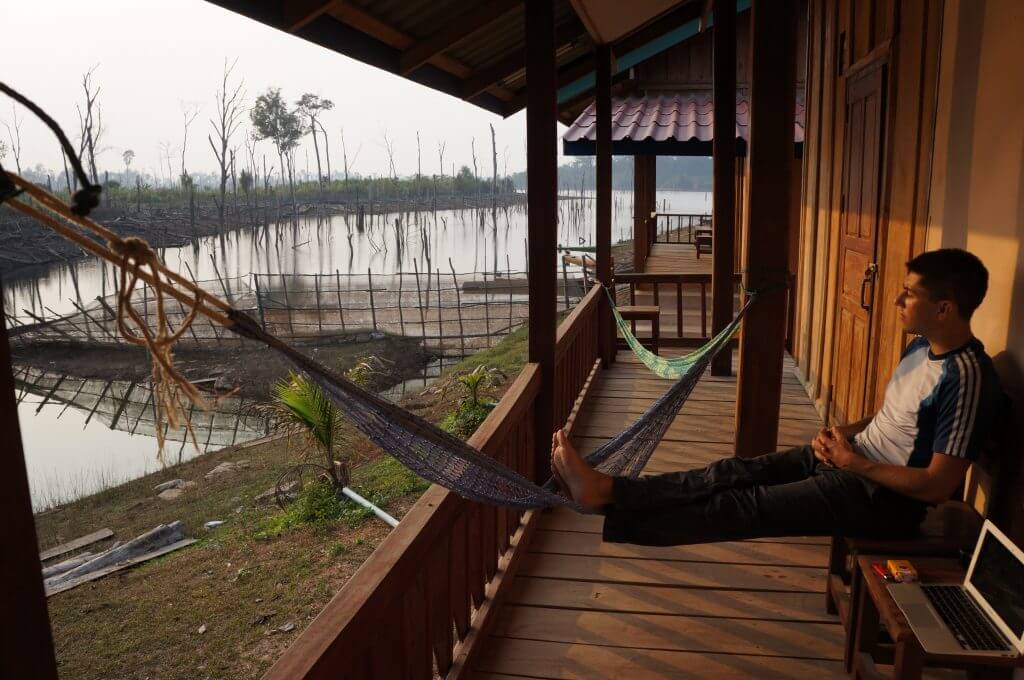
This article contains affiliate links to partner sites. When you use our links to book accommodation, a car, or an activity, you don’t pay anything extra, but we get a small commission. This helps us to offer you free, independent, and ad-free content. Thank you for your support!
The extras budget
Don't forget to leave a little margin in your round-the-world budget to treat yourself along the way, or simply to make up for a last-minute glitch. It can always happen, and you'll be glad to be able to take care of your needs. We kept 2×100 dollars with us at all times, hidden in Fabienne's bra and a pouch belt. Among the extras, we count:
- shopping;
- hairdressing;
- laundry;
- small treats such as more expensive excursions (diving, climbing a volcano in Bolivia, multi-day treks), a short cruise, postage to send parcels home, etc.
- a night in a slightly more luxurious room from time to time;
- a good restaurant!
In the end, we didn't really do the extras we'd planned. Well, yes… Of course, we did do a little shopping, but much less than planned, and we rarely splurged on more luxurious hotels.
BUT, we did have a few unplanned expenses! I bought myself a MacBook Air in Hong Kong to replace my computer, which had given up the ghost. And… following a beautiful proposal on the Great Wall of China, we took the opportunity to have our wedding clothes made in Vietnam and sent back to Switzerland. In short, having a little spare cash means you can treat yourself to a wide variety of things, believe me!



As far as activities are concerned, we took advantage of being in mountainous regions to go trekking, which does add to the price. A word of advice: compare prices online and on-site to avoid paying much more than you should… We recommend you look on Getyourguide or Civitatis. These two sites offer many activities around the world, often at attractive prices.

The hygiene budget
You might not think about it, but depending on the length of your trip (around the world or not), you'll need to buy the basics of your toiletry kit. Shower gel (or solid soap), shampoo, toothpaste, sun cream, moisturizer, sanitary towels… In short, you'll need to renew these essentials if you're going to be on the road for several months. The good news is that you'll find everything you need on the road, even outside the big cities! Well, it's clearly not what's going to explode your total budget, but to put a figure on it, keep in mind the costs of the products you usually buy. In Asia, you'll probably pay less, but the trend is reversed in Oceania and America.
Internet budget and SIM cards
When traveling, it's also important to keep in touch with family and friends. Nowadays, with a smartphone, the problem of communication is quickly solved! WhatsApp, Messenger and Signal are the most common applications for sharing your trip with loved ones.
Although wifi is available just about everywhere in tourist areas, you may still need data. Whether it's to get GPS on your smartphone, book accommodation or take a video call in the wilderness, buying a local SIM card can come in really handy. Prices vary from country to country but expect to pay around ten euros for several gigas of data, equivalent to 1 month's travel within the country. That's not much on the total budget of a round-the-world trip, but it's still worth taking into account.

The budget for bank charges
The question of banks is often a little underestimated in a round-the-world budget. Intuitively, we tell ourselves we've got a bank, a credit card and we're all set. Well, that's true in theory! But on a long-term trip, the bank card is an area where you can make big savings if you take a little interest. The situation will obviously depend on your country of residence or rather your tax domicile.

For Swiss
To determine the best solution, we compared the main banks by subjecting them to a round-the-world scenario. We compared withdrawal fees, transaction fees, and card fees for a 1-year trip, based on an average of 8 withdrawals and 20 online payments per month.
Before leaving, we had a Raifen account and a Credit Suisse account, respectively. We quickly realized that the costs would be considerable over a year's travel. So we opted for PostFinance and its Private Plus account. Withdrawals are free and unlimited abroad, and card payment fees are 1.2% for foreign currency transactions. With 2 credit cards (for online payments) and 2 debit cards (for free withdrawals), this comes to 130 CHF per year:
- 110 CHF/year (1 credit card) or 130 CHF/year (2 debit cards) if you have more than 25 000 CHF in your account;
- 194 CHF/year (1 credit card) or 214 CHF/year (2 credit cards) if you have less than 25 000 CHF in your account.
We're really delighted with our choice of PostFinance! Our Plus card has enabled us to withdraw absolutely everywhere in the world, and we've never needed to make a single withdrawal with a credit card. In fact, we kept this bank after our trip! In 2020, in addition to Postfinance, we opted for a Neon account. It allows us to make card payments free of charge! In short, we think PostFinance and Neon are a perfect combination! We've devoted an article to Neon that explains everything 😉.
Traditional banks
Most banks offer their services online and allow you to manage your accounts from a mobile or a customer area. This is a good thing! The catch is that traditional banks often charge high fees for withdrawals… These fees can either take the form of a fixed amount per withdrawal or a percentage of the amount withdrawn. The simplest thing to do is to ask your current bank about the conditions. Once you have these figures, estimate the cost of your trip.
Be aware that, in most countries, withdrawal amounts are limited, so you may have to withdraw regularly. So it's best to avoid a fixed fee per withdrawal model.
Mobile banks and neobanks
The concept of a mobile bank is that you get a physical card, but then everything happens from your mobile! It is the most practical option when you're traveling! Before signing up, we advise you to determine your needs by comparing fees.

To do this, take note of the number of withdrawals, the number of payments per card, the transaction volume and the withdrawal or payment limits. Some banks have higher fixed fees, but this reduces the commissions/fees for withdrawals. All in all, it's well worth comparing according to your needs!
There are several new-generation banks (Wise, Revolut…) but the one most used by travelers is N26. In a nutshell, N26 is:
- N26: the classic free account. No monthly fees. 5 withdrawals are free, then you pay 2 euros per withdrawal (within the eurozone). Outside the eurozone, the withdrawal fee is 1.7%.
- N26 You: the You option costs 9.90 euros per month and offers the same conditions as the eurozone. Outside the eurozone, however, withdrawals are 100% free, and cardholders also benefit from travel insurance covering medical expenses, among other things.
All in all, if you do the math, the You card is worth it if you withdraw more than 580 euros a month. Which, let's face it, travels fast 😉! If you'd like to find out more about this neobank, you can read our page dedicated to N26.
Current fees
It's important not to overlook any recurring charges you may have at home while you're away. Whether it's a car loan, a loan repayment, your taxes, car or household insurance, water and electricity bills, your telephone package…
Check all your contracts carefully and try to limit these costs as much as possible by canceling anything you don't need in good time. Consider renting or subletting your apartment or house while you're away so that you don't have to pay rent or mortgage repayments.
The cost of a round-the-world trip in a nutshell
The cost of our trip around the world
Here's our little summary table of everything we spent on this round-the-world trip! Yes, banking secrecy may be a Swiss thing, but we've decided to open our account books to you!
| Expense item | How many days? | Cost per person | Daily budget per person (median daily budget for travelers) |
|---|---|---|---|
| Budget in China | 67 days | 1470 € | 22 € (51 €) |
| Budget in Taiwan | 16 days | 403 € | 25 € (30 €) |
| Budget in Hong Kong | 5 days | 204 € | 41 € (71 €) |
| Budget in Thailand | 21 days | 410 € | 19,5 € (44 €) |
| Budget in Cambodia | 25 days | 480 € | 19 € (23 €) |
| Budget in Vietnam | 49 days | 917 € | 19 € (35 €) |
| Budget in Laos | 32 days | 534 € | 17 € (30 €) |
| Budget in Indonesia | 29 days | 649 € | 22,5 € (28 €) |
| Budget in Australia | 5 days | 230 € | 46 € (51 €) |
| Budget in Ecuador | 78 days | 1112 € | 14 € (25 €) |
| Budget in Peru | 35 days | 725 € | 21 € (29 €) |
| Budget in Bolivia | 25 days | 525 € | 21 € (41 €) |
| Budget in Chile | 57 days | 1388 € | 24 € (35 €) |
| Budget in Argentina | 72 days | 1382 € | 19 € (53 €) |
| Plane ticket Argentina-Europe | - | 1450 € | - |
| Travel insurance (supplement for the extension) | 180 days | 490 € | - |
| Large extras (laptop, wedding clothes...) | - | 900 € | - |
| Total budget | 556 days | 17 941 € | 32 € |
In other words, a round-the-world trip that cost us 35 882 euros for 2 people, including all expenses, for just over 18 months. Seen like that, I'll grant you that's a hefty sum! But believe us, we don't regret spending several years saving up for this trip. Every penny was well worth it! Some people decide to buy a new car at that price, but we preferred a round-the-world trip!
If we break down the daily budget per person, we can see that out of the 32 euros:
- 6.3 euros are dedicated to accommodation (19,7 %);
- 5.4 euros to transportation (16,7 %);
- 11.8 euros to food (36,9 %);
- 4.4 euros to sightseeing (13,9 %);
- 4.1 euros to extras (12,9 %).
If you're planning to travel a bit like us and would like to use the figures to estimate your round-the-world budget, feel free to drop by the articles linked in the table above. You'll find much more detail for each destination! We've even created a special category on budgets by country!

How much do you need to budget for travel around the world?
As you can see, the subject of a long trip cost is a vast one. An ultra-insured person, vaccinated against everything, in possession of a plane ticket with many destinations and with the latest equipment, will have no problem spending close to 15 000 euros even before departure.
I'm not particularly fond of averages, but you should know that the price of a round-the-world trip like the one we took is usually around 15 000-20 000 euros per person. This depends on the activities/extras you decide to indulge in (diving, trekking, cruises, parachute jumping, quad biking, etc.) and the countries on your itinerary. Once you've established your budget, don't forget to add a 10% safety margin for small extras. This will give you an excellent estimate!
After all, these figures are VERY theoretical. You'll always find someone who left with 150 euros in their pocket and traveled for 3 years, just as you might hear people tell you that at less than 100 euros a day, travel isn't fun. In short, take these figures as pure indicators and try to make up your own mind.
After this trip and many others, we've listed here 9 tips for saving money when traveling. By paying a little attention to certain points, you can really save money and enjoy your trip for longer!

Another thing to bear in mind is the difficulty of imagining how you're going to manage your travel budget when it's your first trip of this kind. Before we took the plunge, accommodation was my biggest fear. I told myself that we were bound to want to go to hotels that were a bit nicer from time to time. Besides, I'd always told myself that I'd never be seen sleeping in anything with bugs everywhere. Well… Once on the road, I quickly changed my mind. I'd much rather forgo a little character to have more budget available for activities or a glass of wine. As long as the place was safe and reasonably clean, I was generally delighted!
Costs for your return from your round-the-world trip
For most long-term travelers, this is an expense that usually is overlooked. But it's essential to set aside a little to tide you over when you return. We were lucky enough to be able to stay with our parents for a few weeks on our return, but it was still handy to have a small budget for outings and the first expenses associated with settling in before getting paid!
It's hard to give you an ideal amount… It may vary depending on your country, how long you think it will take you to find a job again, or whether, like us, you have parents who are cool enough to put you up for a while. In short, we put 2500 euros each into an account for the return. That may sound like a lot, but in Switzerland, you don't get very far with that!

To tell you the truth, everything happened very quickly. Knowing that we'd be looking for work, we started the process 2 months before our return. After a few rounds of first interviews online, I had second interviews the day after we arrived in Switzerland. We first lived with our parents for 15 days, then moved 250 km away for me to start my new job. The result? Before I got my first salary, we had to be in a strong enough financial position:
- 3 months deposit on the apartment;
- our transport passes to get to work (to the interviews for Benoit);
- a first wave of furniture to at least have a bed and a table in our new home;
- small purchases that quickly add up: dishes, vacuum cleaner, sheets… We certainly picked up a few things left and right, but the shopping list was still long!
In short, don't forget to include a small sum dedicated to your return in your round-the-world budget!
How can you save money to travel around the world?
One of the most common reactions we hear before we leave is:
How can you afford to travel around the world? Did you win the lottery?
The answer is clearly no, unfortunately. On the other hand, we've been saving up to travel. But how? By changing our lifestyle a little before we left. Let's just say we continued to live a bit like students, despite being salaried.
What makes me smile is that 90% of the people who remark on our so-called fortune would have the budget to do a round-the-world trip in less time than it would take if they made a few small sacrifices…

In any case, there's no miracle when it comes to saving money: either you spend less, or you earn more! The best way is to do a bit of both, and here are our ideas on how to afford the trip of your dreams!
Spend less
Limit meals out a little
Young employees tend to go out to restaurants regularly to "have a bite to eat". This little something never costs much, but it's always more expensive than a good meal at home. At lunchtime, opt for meals brought from home rather than going to the canteen/corner restaurant/fast-food restaurant. It's cheaper and much healthier too!
Instead of going to the movies, consider having a movie night at home, or if you decide to go to the cinema, take a small snack and a drink with you so you don't break the bank by buying popcorn.
Stop smoking
It sounds silly, but 1 pack a day for 1 year is at least equivalent to the value of a round-the-world plane ticket… That's right!
Rethink car use
Sometimes, I agree, it's indispensable. But if you live in the city, couldn't a transit pass do the trick for a year? With the value of the car, insurance, gas, repairs, parking, and so on, I guarantee that the savings potential alone already represents a good part of a round-the-world budget! So get out those bikes and build up those calves! They'll come in handy when you're on the road anyway 😉.
If it's impossible to change your means of transport, one option is to offer carpooling. In addition to making your journeys more profitable, you might even meet some nice people!

Stop the superfluous
Some of my friends who used to comment on my budget are addicted to going to the beautician for waxing, the hairdresser every two months, the manicurist every 3 weeks, the relaxing massage twice a month… All in all, the beauty costs represent more than 200 euros a month!
Learn how to hold a nail polish brush and an epilator, and let me grow this hair out! You'll see that it won't make any difference when you travel!
Limit shopping
Those who know me will know that this is where I've made the most effort. I used to be what you might call a shopaholic. But then, I REALLY reined myself in for 2 years, which has led me to be quite a minimalist today! At the same time, you had to be a tad more rational to pack a bag for a trip. In my closet, I had enough to fill 30 backpacks, and until the last news, I only took one on a round-the-world trip. So, let's take it easy and learn to think about the real purpose of yet another little T-shirt before buying it.

Stop all unnecessary subscriptions
You know that gym you promise yourself you'll go to 3 times a week, and you're happy if you go twice a month? The same goes for paid subscriptions: Netflix, Spotify, Amazon Prime and co. Yes, it's cool, but clearly dispensable.
Force yourself to write down expenses
It sounds silly, but I guarantee you that keeping a little notebook where you write down all your expenses helps you realize where you can save.
To illustrate, here's a real-life example! I used to have a habit of buying a small Diet Coke on my way back to work after lunch, which amounted to 2 euros every lunchtime. But if I bought the Coke in 12-packs at the supermarket, it would cost me less than 1 euro each. In short, I didn't give up my Coke, but I took it from home. Saving 1.1 euros every lunchtime for a year's work, or 251 working days, gives a saving of 280 euros on my Diet Coke alone. To give you an idea, 280 euros represents almost 2 weeks' travel in Asia!

Earn more
Saving to travel is great, but earning more isn't bad either! What if we told you that there are plenty of ways to earn a little more?
Work overtime
It's not always possible, but if you can, go for it! By working an extra 20 minutes a day, you'll be able to help finance your trip!
Do odd jobs
That's easier said than done, but why not look for a little evening or weekend work to supplement your income? Waitressing, sales, warehousing, going to the market on Saturdays, pet-sitting, house-sitting, babysitting, etc., the possibilities are endless! And when you're fed up, remember that for 15 euros you can live for a whole day in many Asian countries, including accommodation, food and transportation. That should keep you motivated for a few months!
Offer your knowledge
Are you bilingual? Web programming holds no secrets for you? Are you a talented graphic designer? Is writing your hobby? Do you know how to find the best flight deals on the net? Offer your services on community sites such as Upwork, Fiverr or Comeup.
Sell
We all have dozens hundreds of things at home that we no longer use! So don't hesitate to put them up for sale online! Got an old iPhone sitting in your drawer? Withdraw a hundred euros or so: you'll make someone happy and you'll have financed 1 week in Asia! Personally, I've made over 1000 euros selling only things I no longer use. Old iPad, handbags, perfumes, clothes, paintings, mirrors, various pieces of furniture, decorative items, blankets, old curtains, lamps, and so on. Today, you're spoilt for choice when it comes to selling online: Gumtree, Marketplace, eBay, Vinted and many others! If you have lots of knick-knacks, you might also consider selling them at a flea market.
Jobs that allow you to travel
Leaving everything behind and planning a round-the-world trip is not the only way to discover the world. If giving up your income completely or the prospect of "doing nothing" doesn't appeal to you, rest assured that there are plenty of options for traveling the world while working. Here's a quick roundup of the best jobs for travelers!

Working abroad or applying for a WHV
In Europe
We're starting this list with a form of compromise. This is the option we chose when we moved to Vienna, Austria in 2011. During our expatriation, we found a permanent position in the Austrian capital and took a furnished apartment (we only wanted to stay for 1 or 2 years). In short, a sedentary life with all the comforts that go with it, but abroad! The advantage? We have a regular salary and plenty of options for getting out and about on weekends or vacations! From Vienna, we were able to travel to Slovenia, Slovakia, the Czech Republic, Croatia and, of course, all over Austria. We'll do it again in Chiang Mai in 2016, after our round-the-world trip. Then we became digital nomads, and we explain it all in this article!
Abroad, with a WHV
Granted, Vienna probably isn't the most exotic option! We also know people who have decided to move to Hong Kong or Taipei. As a result, long-weekend getaways tend to be in the Philippines or Indonesia!
If you're under the age of 30-35, you can apply for a WHV (Working Holiday Visa). You're bound to find a country that appeals to you, aren't you? 😉 Many young working people opt for this visa, which reconciles vacations with work as its name suggests. In short, it's a great way to spend several months or even years in a new country! To find out all you need to know about the WHV, we refer you to the excellent Pvtistes website.

Working online
There are plenty of options here! The Internet allows you to be 100% mobile, and depending on your profession, you can quite easily consider pursuing all or part of your business on the road! Here are a few examples of professions or activities that enable you to earn money while working from a computer:
- graphic designer, illustrator, or web designer: a full-fledged profession that can be practiced from anywhere. Zoom appointments with customers, beautiful landscapes for inspiration and, of course, a good Internet connection to send your work are all part of the daily routine.
- web developer: developer is still a very popular profession, and demand from both private and corporate clients remains strong. Even when traveling, a developer can easily continue to find customers. What's important? To have a good address book before you leave, as well as a web presence offering your services. This is what we do with Novo-media, in addition to our blog.

- freelance translator: a job that can be done from anywhere! Are you perfectly bilingual and have impeccable spelling? Why not offer your services online to help companies and individuals with their translations?
- freelance journalist: a great way to put into words what you see and discover on your travels!
- freelance travel blogger/web copywriter: we'd warn you about this one though… Making a living from blogging is possible, but it requires a lot of time, a good dose of talent and a dash of luck. If you persevere, your blog can add a little extra to your round-the-world budget! Alternatively, you can offer your services as a web copywriter through platforms such as Malt or those mentioned above.
- SEO consultant: you're an expert in the web and SEO? Perfect! Offer your services online to other companies: website audit, the definition of positioning keywords, creation of a web strategy… To make yourself known? A well-referenced site on the subject!
- community manager: a new profession born 100% of the Internet! A community manager is a person who manages various social networks (Facebook, Twitter, Instagram, Pinterest, TikTok, etc.) on behalf of a client. A great way to make ends meet! You'll just have to watch out for time zones because, on social networks, the time of publication is almost as important as the content. Your customer probably won't be happy if you always post at 3 a.m. local time because you're on the other side of the world!
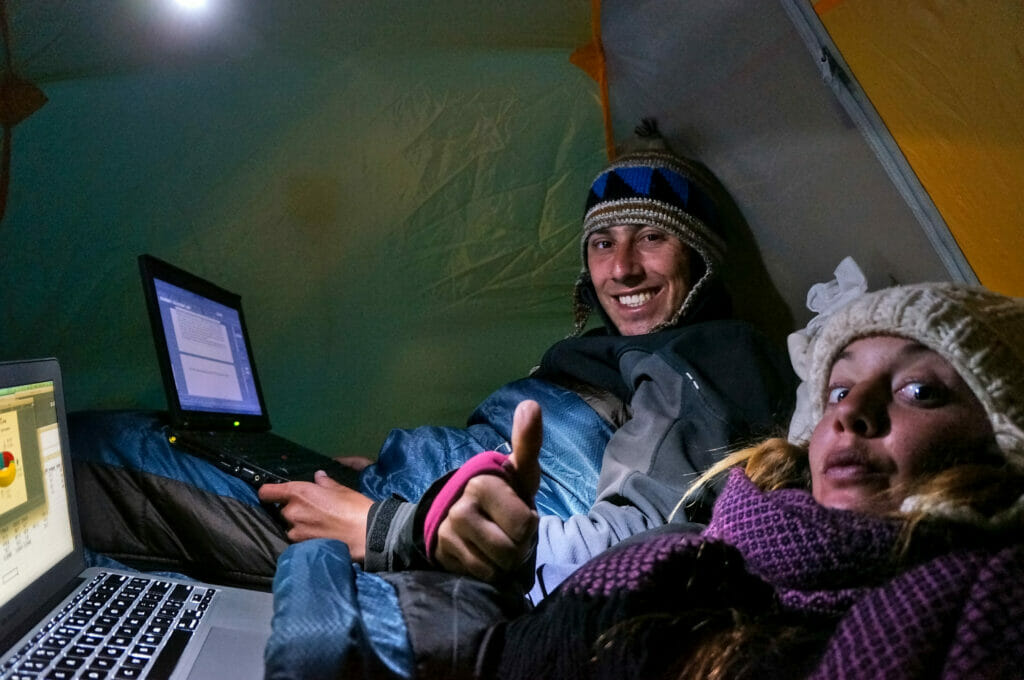


WWOOFING
The word "Woof" stands for World Wide Opportunities on Organic Farms. It's a network that connects people who want to work on farms with farmers who need labor for a given period. This type of travel provides you room and board, to save money, but also to discover a country's way of life and meet new people! For more information, visit the official website. Over the years, several other networks have developed, offering similar activities, such as HelpX and Workaway.
Teaching
Do you have specific knowledge? Why not take advantage of your trip to share a little of your knowledge? Whether you're a language, dance, yoga, diving, skiing, snowboarding, or music teacher, the options are endless! Here's an example: a friend of ours managed to get hired as a ski instructor for a season in Whistler, Canada. An absolute dream for a ski fan, and a great way to replenish the coffers before hitting the road again! Another example: a friend had gone to Mexico to travel. There, she took her scuba diving exam and never came back! She now travels all over Latin America teaching diving in different spots. On the other hand, with rare exceptions, teaching means you'll have to settle in one place for a few weeks or even months. But you have to admit, there are worse things!
Being a humanitarian aid worker
There are many large organizations where a wide range of skills are in demand: doctors, nurses, administrative staff, lawyers, interpreters, firefighters, logisticians, project managers, etc. The list goes on! Find out more about the humanitarian organizations that appeal to you, and see if they offer missions abroad. Very often, these jobs require you to travel regularly all over the world for periods ranging from a few weeks to a few months.

Doing odd jobs on the road
If you're traveling in backpacking mode and decide to stop in a city, several jobs can be done depending on the season. During our round-the-world trip, we saw many advertisements in youth hostels offering to work in the hostel (cleaning, reception, bar, etc.) in exchange for free accommodation and sometimes even food or a small salary.
Otherwise, you always have the option of browsing the shops and bars. It's not uncommon for them to be looking for waiters/vendors for the few weeks of high tourist season.
Being a travel photographer
Are you good at photography? Really good? Then maybe selling your photos taken on the road could be a good way to earn some extra cash! But let's not kid ourselves: photography is a profession in its own right, and the likelihood of "amateur" photos finding takers is relatively low. But if you're a professional or a confirmed amateur, it can be a very good idea!

Being a skipper
You're not seasick and you know a thing or two about sailing? Skipper could be the job for you! Let's face it: if you're a skipper, you'll spend most of your time at sea. That said, it could be a great way to reach a new continent and make a little extra money at the same time.
Reveal your inner artist
If you have artistic talent (unlike us), why not put it to good use on the road? Here's a small list of activities from travelers we came across on our trip:
- hairdresser: yes! Offering your services in a hostel to other travelers can be an original way to earn a few euros.
- street artist: juggling, music, dance, acrobatics, etc. If you're good at it, go for it!
- craftsman: we came across several travelers selling handmade jewelry or knitted hats to other tourists in hostels or on the street. Again, probably not a great fortune, but a nice way to earn a bit of money. Try to choose a touristy spot, and you'll maximize your chances of earning a few euros!
Are you still with us after this chapter about the cost of a round-the-world trip? If you have any questions, don't hesitate to ask us in the comments section. In the next chapter, we'll explain in more detail how to plan a round-the-world itinerary!
Download our free pdf E-book!
Subscribe to our Newsletter and get a free E-book with more than 100 pages to help you prepare your trip around the world

Pin it





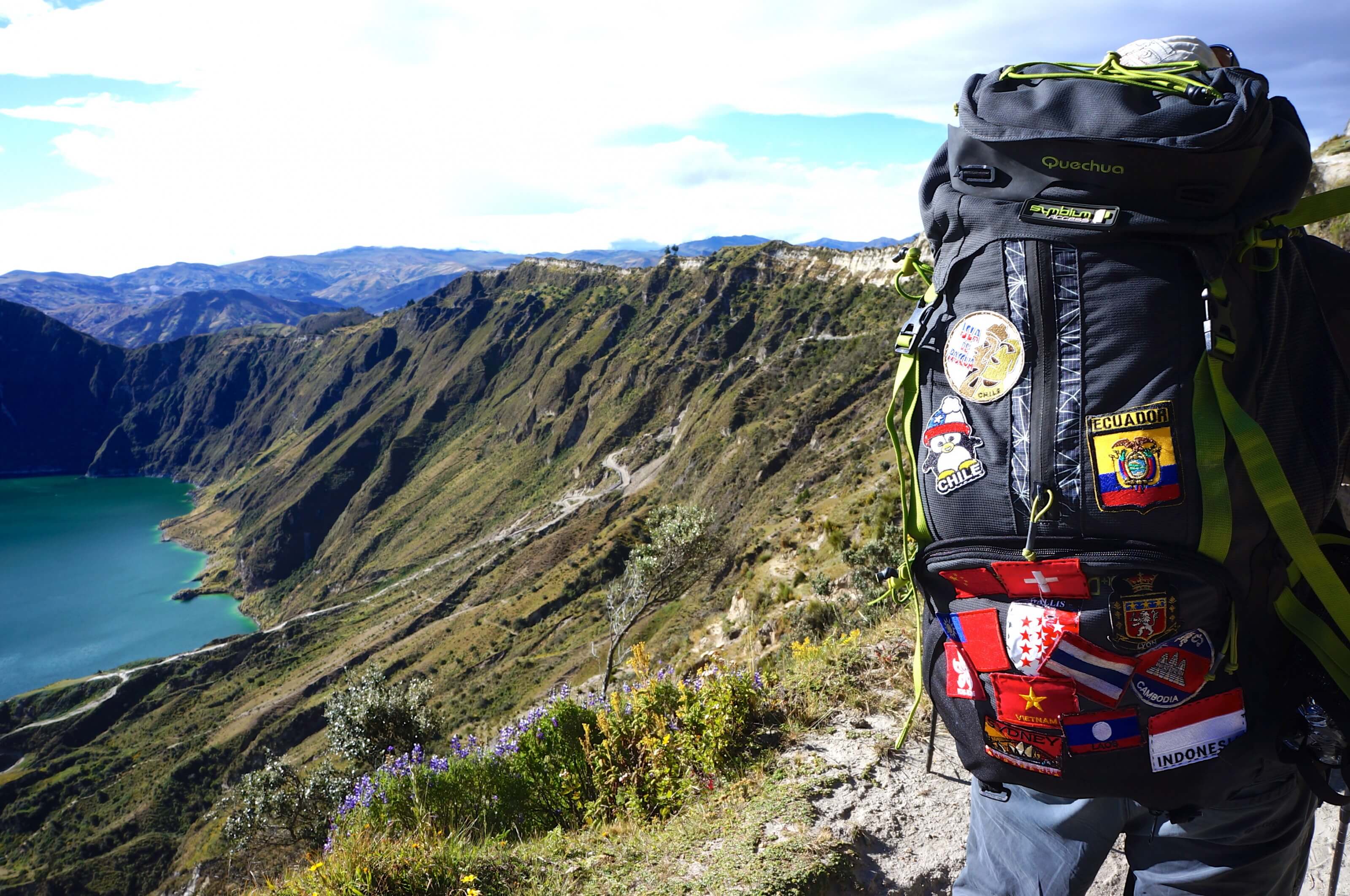


Join the discussion